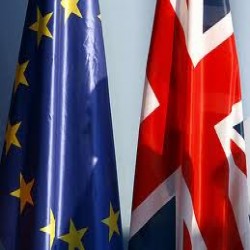Analytics
The best Experts' Views, Marks and Forecasts on Economics >>
Rules of Entry and Participation. Become a Member of Professional Society of Economic Journalists! >>

As the dust settles from the EU's Brussels summit debacle two weeks ago and government leaders prepare for a difficult 2012, it is worth taking stock of how the UK's decision to block a Treaty-based solution to the euro-crisis might play out.
David Cameron's reputation may have taken a beating in continental Europe, but his political capital has risen significantly among Conservative MPs since he took his stand in Brussels. The question is whether this now provides any space for him to engineer a compromise with other EU leaders that gives him and them more of what they want. The answer is largely, but not entirely, out of his hands.
Domestic politics have played a dominant role throughout the euro-crisis, as much in Germany and France as in the UK. Chancellor Angela Merkel's every step through the euro-crisis has been measured against her own domestic political considerations, from the anti-Southern Europe bias of much of the CDU party, to the no-euro-bail-out mantra of the Bundesbank and Germany's Constitutional Court. Not only has this stopped her from supporting a rise in the size or fire power of the European Financial Stability Facility. It has also stopped her from broaching with her public the simple fact that the Greek, Portuguese and other euro debt crises are, in fact, Germany's sub-prime crisis. Put simply, German banks were involved alongside other European banks in lending money to the Greeks to buy German exports that they could not afford. Now, this game of financial musical chairs is over and Germany is refusing to take the parcel.
But, alongside the German aversion to bailing out Europe's spendthrift south lies an equally deep scepticism towards an intergovernmental solution to the euro-crisis. For Angela Merkel and the CDU, the long-term stability of the eurozone requires the discipline of legally binding rules that will prevent all eurozone governments from mismanaging their budgets again in the future. The Brussels summit did not achieve this goal.
This brings us to President Nicolas Sarkozy. Domestic concerns have been equally central to his thinking and actions. Securing an intergovernmental arrangement at the Brussels summit for the proposed 'fiscal compact', every Gaullist's first choice, helped mute the increasingly vocal accusations in Paris that he was being steamrollered by Germany and its desire for a new EU Treaty. The French remain sceptical of any arrangement that removes political flexibility over their economic policy. And to secure this victory while blocking David Cameron's attempt to protect the City, which he and the French business establishment view with deep suspicion, was the icing on the cake as he prepares for Presidential elections in April next year.
President Sarkozy may therefore wish to crack on with an intergovernmental approach to the new fiscal compact. But is the outcome of the summit durable? Angela Merkel would still like to see a more formal role for the European Commission and European Court of Justice in overseeing the fiscal compact. For his part, David Cameron must be aware that the UK is not in a tenable position for the long-term. The UK is isolated politically and would take some of the blame if the euro collapses as a result of markets' frustration with the eurozone's inability to establish a credible mechanism for managing the currency. And the UK can still be over-ruled on future financial services regulation, given that this remains an area of qualified majority voting.
Importantly for Angela Merkel and David Cameron, most other eurozone governments do not appear to be happy with the outcome of the summit either. On the one hand, the fiscal compact potentially represents one of the most significant dilutions in the sovereignty of national parliaments since the founding of the European Community in 1957. Domestic political groups are challenging the compact in countries such as the Netherlands and Ireland which are inside the euro and those such as Denmark and Hungary which are not.
On the other hand, no EU member state other than France likes the idea of the eurozone being governed by a Franco-German duo. Yet this would be the inevitable outcome of an intergovernmental approach to the fiscal compact in which the role of the Commission, traditionally the protector of small state interests in the EU, was circumscribed to supervising the agreement rather than managing it.
As with the many other crises that the EU has survived over its 54-year history, a compromise could be negotiated between now and the next EU summit in March 2012. Such a compromise would involve the UK supporting the desire of the majority of eurozone members and the 'pre-ins' for a minimal Treaty-based change to the governance of the eurozone, in return for some safeguards on the future of EU financial regulation. This was the deal David Cameron went to Brussels hoping to strike.
Recent comments by EU President Herman Van Rompuy and Germany's Foreign Minister Guido Westerwelle imply that there may be some room for manoeuvre. But for any new agreement to be reached, David Cameron will need to expend some of the political capital that he acquired in Brussels.
In particular, he will need to face down the 80 or so ideologically eurosceptic MPs in his party, who believe that the UK would now be better off outside the EU altogether and see 2012 as the year to begin this campaign in earnest. And he will need to have the support of the 226 other Conservative MPs, most of whom are also eurosceptic, but more pragmatically focused on not ceding any further sovereignty to Brussels over UK economic policy-making, especially in the area of UK financial services.
If David Cameron cannot deliver the majority of his party in backing a compromise on the EU's new financial compact, why should other EU leaders bother to challenge their own domestic constituencies and let Britain be part of the deal?